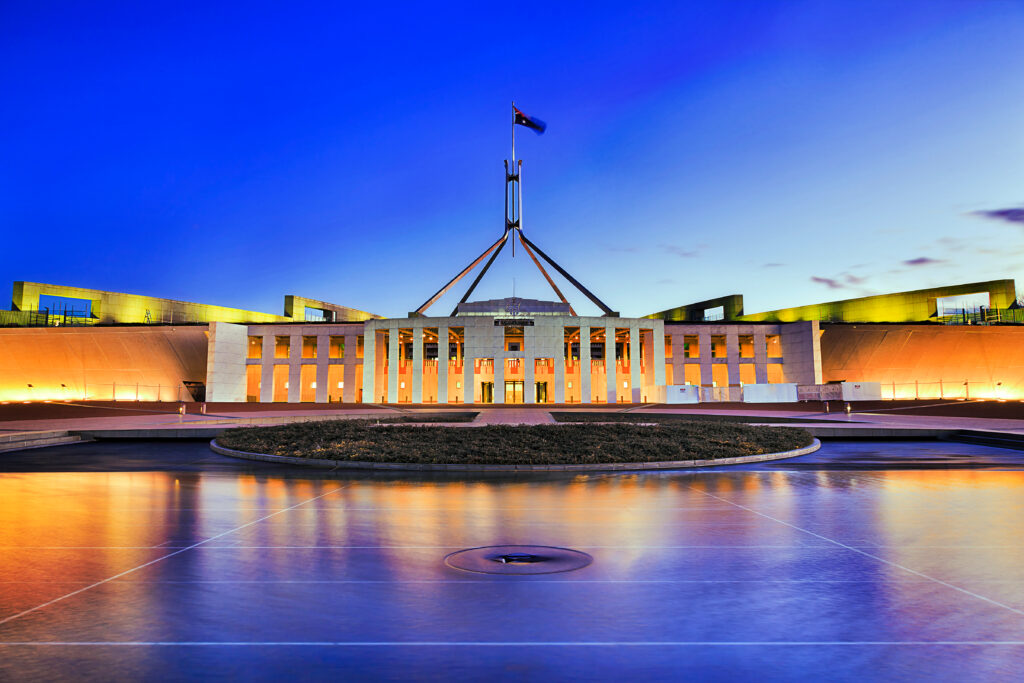As an international student living and working in Australia, it can be helpful to understand how Australian politics works.
Changes to policies and laws can influence immigration, education, the economy and business – all things that play a big role in shaping your student life and future career prospects in Australia.
Australia’s political system
Australia is a federal parliamentary constitutional monarchy. This long (and confusing) title means it combines elements of a monarchy, a parliamentary system and a federal structure of government.
The monarchy: The monarch of Australia is also the monarch of the United Kingdom: King Charles III. In Australia, the monarch’s role is largely ceremonial and symbolic, with no involvement in the day-to-day affairs of government. However, they are represented by the Governor-General who performs ceremonial duties like inviting a new Prime Minister to office.
Federal – Powers of the Australian government are split between federal (national) and state. The federal government is responsible for national issues like defence, foreign affairs, trade, immigration, and telecommunications.
State: State governments govern over areas not covered by the federal government, including education, health, police, and transport.
There are other areas such as taxation and environmental laws are areas that both federal and state governments can legislate. However, in cases of conflict, federal law prevails.
Prime Minister: The Prime Minister is typically the leader of the party or coalition that has the most seats in the House of Representatives. They set policy direction, represent the country at international events, choose ministers to oversee certain sectors and propose bills.
House of Representatives and Senate: Australian citizens vote for who will represent them in government. These members of parliament (MPs) make up the House of Representatives. These MPs can propose new laws, known as bills.
Once a new bill has been made, it must also get approval from the Senate, which is also made up of elected officials.
Australia’s major political parties
Australia largely operates as a two-party system. These two parties are:
Australian Labor Party (ALP):“Labor” as it is often referred to, is typically a more democratic socialist party aligning “centre-left” of the political spectrum. Their beliefs include progressive taxation, where wealthier individuals pay more taxes, and strong support for rights such as same-sex marriage, gender equality, Indigenous rights and cultural diversity.
Liberal Party of Australia: Typically considered a “centre-right” party, the Liberal Party supports conservative economic and social policies. It is often associated with support for a market-based economy, encouraging investment and innovation through policies that reduce business costs and promote economic growth. Socially, the party supports traditional family values, a strong law and order policy, and limited government involvement in personal matters.
Minor political parties
Australia’s political landscape also includes a number of smaller parliamentary parties that play crucial roles, particularly in the Senate where they can hold the balance of power. Here are some of the other significant parties:
- The Nationals: Centre-right political party primarily focused on representing rural and regional Australia.
- The Australian Greens: A left-wing party with a strong emphasis on environmental and social justice issues.
- One Nation: A right-wing populist party that emphasises nationalism and strict immigration policies.
- Centre Alliance (CA): Often focuses on social liberalism and populism.
- David Pocock: An independent senator known for his advocacy of environmentalism and progressivism.
- Jacqui Lambie Network (JLN): Known for its populism and social conservatism.
- Katter’s Australian Party (KAP): Led by Robbie Katter, this party emphasises social conservatism and developmentalism.
- United Australia Party (UAP): Known for its right-wing populism.
A full list of Australian political parties can be found here.
Voting
Australian citizens (who are 18 years and older) are required to vote in federal elections. While there are some special exceptions, voters are fined if they do not participate. Elections are also always held on a Saturday in Australia. Those overseas can vote using a postal vote system.
Temporary and permanent residents cannot vote in federal and state elections or referendums.
How elections are won
A federal election is held at least once every three years. The Australian Constitution sets the maximum term of the House of Representatives at three years, but the prime minister can choose to request an election earlier – a snap election.
At these federal elections, voters select who they choose to be members of parliament in the Senate and the House of Representatives (two separate ballots).
At a federal election, the party with the majority of members elected to the House of Representatives becomes the Australian government. The leader of the winning party is the Prime Minister.
Current important political issues
The current political landscape in Australia is filled with important issues such as:
Climate change: Climate change remains a significant concern in Australia, particularly in the wake of events like the 2020 bushfires. The country’s reliance on agriculture and natural resources such as coal and natural gas adds complexity to policy decisions, balancing economic interests with environmental protection.
More information on Australia’s strategies can be found here.
Immigration: Australia’s immigration policy focuses on attracting skilled migrants, including students and qualified workers. As an international student, keeping up to date with Australia’s immigration policy can help you understand your visa and employment opportunities.
Cost of living/housing: Post-pandemic, cost of living concerns have been rising in Australia. Key metrics to watch include the inflation rate, CPI and cash rate, which all influence things like average rental, grocery and petrol prices.
Human rights: Australia has an ongoing discourse concerning women’s rights, indigenous rights and LGBTI+ rights. Understanding the historical trauma and ongoing consequences faced by marginalised groups can help you get involved in worthwhile causes and understand Australia’s political landscape.
Engaging with Australian politics
As a student, your opinions, voice and community are important and getting involved in politics can be a worthwhile venture, regardless of your political views.
University clubs can offer a starting point to learn more, and engaging with reputable media sources for information is a good start.
Read more: Can I Get Involved in Australian Politics as an International Student?





